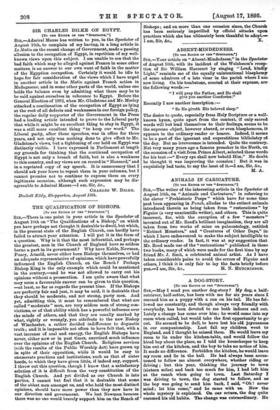THE QUALIFICATION OF BISHOPS.
[To THE EDITOR OF THE " SPECTATOR."] SIR,—There is one point in your article in the Spectator of August 10th on "The Qualifications of a Bishop," on which you have perhaps not thought it desirable to dwell, but which, in the present state of the English Church, can hardly have failed to attract your attention. I will put it in the form of a question. Why is it that the most influential, and perhaps the greatest, men in the Church of England have so seldom borne a part in its government? Why have Keble, Newman, Pusey, Arnold, never either been Bishops themselves, or had an adequate representative of opinions, which have powerfully influenced the English Church, on the Bench ? Perhaps Bishop King is the only example which could be mentioned in the century,—and he was not allowed to carry out his opinions without a prosecution. I am quite aware that what may seem a favourable answer can be given to this question, —at least, so far as regards the present time. If the Bishops are perfectly fair and just, it may be said, it is desirable that they should be moderate, and not strong, party men. And yet, admitting this, it must be remembered that what are called " moderate " men, are very seldom men of strong con- victions, or of that ability which has a powerful influence over the minds of others, and that they are usually marked by what, rightly or wrongly, you attribute to the new Bishop of Winchester, a rather decided indifference to dogmatic truth ; and it is impossible not often to have felt that, with a vast increase of zeal and energy, the English Bishops have never, either now or in past times, exercised much influence over the opinions of the English Church. Religious services (vide the results of the Public Worship Act) have grown up in spite of their opposition, while it would be easy to enumerate practices and institutions, such as that of sister hoods, to which they have given little, if indeed any, support. I throw out this question, though I know that a satisfactory solution of it is difficult from the very constitution of the English Church. And yet divided as our Church is into parties, I cannot but feel that it is desirable that some of the ablest men amongst us, and who hold the most distinct opinions, should have more power than they now have in our direction and government. We lost Newman because there was no one would bravely support him on the Bench of
Bishops ; and on more than one occasion since, the Church has been seriously imperilled by official attacks upon practices which she has ultimately been thankful to adopt....-


































 Previous page
Previous page